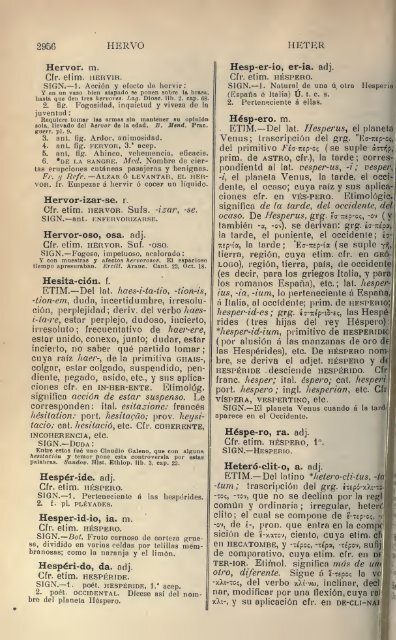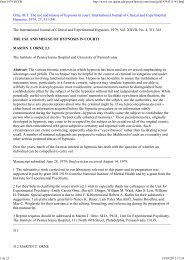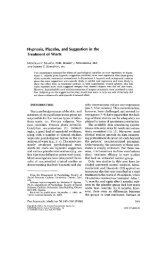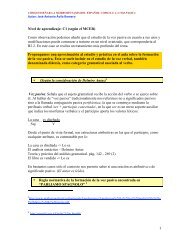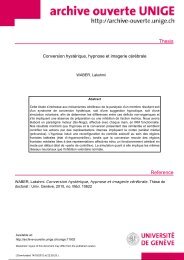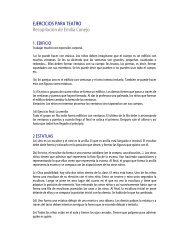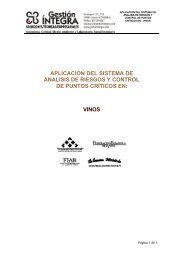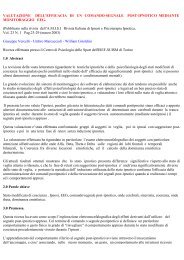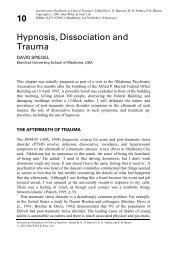Diccionario filológico-comparado de la lengua castellana
Diccionario filológico-comparado de la lengua castellana
Diccionario filológico-comparado de la lengua castellana
Create successful ePaper yourself
Turn your PDF publications into a flip-book with our unique Google optimized e-Paper software.
2956 HERVO HETER<br />
Hervor, m.<br />
Gfr. etim. hervir.<br />
SIGN.— 1. Acción y efecto <strong>de</strong> hervir:<br />
Y en un vaso bien atapado se ponen sobre <strong>la</strong> brasa,<br />
hasta que <strong>de</strong>n tres hervores. Lag. Diosc. lil). 2, cap. 68.<br />
2. fig. Fogosidad, inquietud y viveza <strong>de</strong> <strong>la</strong><br />
juventud<br />
Requiere tomar <strong>la</strong>s armas sin mantener su opinión<br />
so<strong>la</strong>, llevado <strong>de</strong>l hervor <strong>de</strong> <strong>la</strong> edad. B. Mend. Prac.<br />
guerr. pl. 9.<br />
3. ant. fig. Ardor, animosidad.<br />
4. ant. fig. FERVOR, 3.' acep.<br />
5. ant, fig. Ahinco, vehemencia, eficacia.<br />
6. •<strong>de</strong> <strong>la</strong> sangre. Mcd. Nombre <strong>de</strong> ciertas<br />
erupciones cutáneas pasajeras y benignas.<br />
Fr. ¡I Rofr. —Alzar ó levantar, el hervor,<br />
fr. Empezar á hervir ó cocer un líquido.<br />
Hervor-izar-se. r.<br />
Cfr. etim. hervor. Sufs. -izai\ -se.<br />
SlGN.—ant. enfervorizarse.<br />
Hervor-oso, osa. adj.<br />
Cfr. etim. hervor. Suf. -oso.<br />
SIGN.— Fogoso, impetuoso, acalorado:<br />
Y con muestras y afectos hervorosos. El espacioso<br />
tiempo apresuraban. Ercill. Arauc. Cant. 23, Oct. 18.<br />
Hesita-ción. f.<br />
ETIM.— Del <strong>la</strong>t. haes-i-ta-tio, -tion-is,<br />
'íion-em, duda, incertidumbre, irresolución,<br />
perplejidad; <strong>de</strong>riv. <strong>de</strong>l verbo haes-<br />
i-ta-re, estar perplejo, dudoso, incierto,<br />
irresoluto; frecuentativo <strong>de</strong> haer-ere,<br />
estar unido, conexo, junto; dudar, estar<br />
incierto, no saber qué partido tomar;<br />
cuya raíz haer-, <strong>de</strong> <strong>la</strong> primitiva ghais-,<br />
colgar, estar colgado, suspendido, pendiente,<br />
pegado, asido, etc., y sus aplicaciones<br />
cfr. en in-her-ente. Etimológ.<br />
significa acción <strong>de</strong> estar suspenso. Le<br />
correspon<strong>de</strong>n: ital. esitazione; francés<br />
hésitation; port. hesitando; j)rov. heysitacio;<br />
cat. hesitado, etc. Cfr. coherente,<br />
INCOHERENCIA, etC.<br />
SIGN.—Duda:<br />
Entre estos fué uno C<strong>la</strong>udio Galeno, que con alguna<br />
hesitación y temor pone esta controversia por estas<br />
pa<strong>la</strong>bras. Sandov. Hist. Ethiop. lib. 3, cap. 22.<br />
Hespér-i<strong>de</strong>. adj.<br />
Cfr. etim. héspero.<br />
SIGN.— 1. Perteneciente á <strong>la</strong>s hespéri<strong>de</strong>s.<br />
2. f. pl. PLÉYADES.<br />
Hesper-id-io, ia. m.<br />
Cfr. etim. héspero.<br />
SIGN.-— fio?!. Fruto carnoso <strong>de</strong> corteza gruesa,<br />
dividido en varias celdas por telil<strong>la</strong>s membranosas;<br />
como <strong>la</strong> naranja y el limón.<br />
Hespéri-do, da. adj.<br />
Gfr. etim. hespéri<strong>de</strong>.<br />
SIGN.— 1 . poét. HESPÉRIDE, 1.' acep.<br />
2. poét. OCCIDENTAL. Dícese así <strong>de</strong>l nombre<br />
<strong>de</strong>l p<strong>la</strong>neta Héspero.<br />
Hesp-er-io, er-ia. adj.<br />
Gfr. etim. héspero.<br />
SIGN.— 1. Natural <strong>de</strong> una ú otra Hesperia<br />
(Kspaña é Italia) Ú. t. c. s.<br />
2. Perteneciente á el<strong>la</strong>s.<br />
Hésp-ero. m.<br />
ETIM.— Del <strong>la</strong>t. HesperuSy el p<strong>la</strong>neta<br />
Venus; trascripción <strong>de</strong>l grg. "Ea-Trep-Cí;,<br />
<strong>de</strong>l primitivo Fíc-Ktp-oti (se suple áaTvíp,<br />
prim. <strong>de</strong> astro, cfr.), <strong>la</strong> tar<strong>de</strong>; correspondientd<br />
al <strong>la</strong>t. vesper-us, -i ; vesper^<br />
-í, el p<strong>la</strong>neta Venus, <strong>la</strong> tar<strong>de</strong>, el occi-<br />
<strong>de</strong>nte, el ocaso; cuya raíz y sus aplicaciones<br />
cfr. en vés-pero. Etimológic.<br />
significa <strong>de</strong> <strong>la</strong> tar<strong>de</strong>, <strong>de</strong>l occi<strong>de</strong>nte,, <strong>de</strong>l<br />
ocaso. De Hesperus, grg. I'a zep-c?, -ov (y<br />
también -a, -ov), se <strong>de</strong>rivan: grg. áa-zépa,<br />
<strong>la</strong> tar<strong>de</strong>, el poniente, el occi<strong>de</strong>nte; ¿a-<br />
Ttep-ía, <strong>la</strong> tar<strong>de</strong>; 'Ea-wp-ía (se suple yíj,<br />
tierra, región, cuya etim. cfr. en geólogo),<br />
región, tierra, país, <strong>de</strong> occi<strong>de</strong>nte<br />
(es <strong>de</strong>cir, para los griegos Italia, y para<br />
los romanos España), etc. ; <strong>la</strong>t. hesperius,<br />
-ia, -ium, lo perteneciente á Españ<br />
á Italia, al occi<strong>de</strong>nte; prim. <strong>de</strong> hesperi<br />
he.sper-id-es ; grg. ía-rcep-tS-e?, <strong>la</strong>s Hesp<br />
ri<strong>de</strong>s ( tres hijas <strong>de</strong>l rey Héspero);<br />
*hesper-id-ium, primitivo <strong>de</strong> hesperidic<br />
(por alusión á <strong>la</strong>s manzanas <strong>de</strong> oro <strong>de</strong><br />
<strong>la</strong>s Hespéri<strong>de</strong>s), etc. De héspero nom<br />
bre, se <strong>de</strong>riva el adjet. héspero y d6<br />
hespéri<strong>de</strong> <strong>de</strong>scien<strong>de</strong> hespérido. Gfr<br />
franc. hesper; ital. espero; cat. hesperi,<br />
port. héspero ; ingl. Jtesperian, etc. Cfr<br />
VÍSPERA, vespertino, etc.<br />
SIGN.— El p<strong>la</strong>neta Venus cuando á <strong>la</strong> tard<br />
aparece en el Occi<strong>de</strong>nte.<br />
Héspe-ro, ra. adj.<br />
Cfr. etim. héspero, 1°.<br />
SIGN.—Hesperio.<br />
Heteró-clit-o, a. adj.<br />
ETIM.— Del <strong>la</strong>tino *hetero-cli-tus, -tú¡<br />
-tum; trascri[)ción <strong>de</strong>l grg. tT6p¿-y.Xi-toi|<br />
-To?, -xov, que no se <strong>de</strong>clina por <strong>la</strong> regl{<br />
común y ordinaria ; irregu<strong>la</strong>r, heterdl<br />
dito; el cual se compone <strong>de</strong> é'-Tep-o?, -i<br />
-cv, <strong>de</strong> £-, pron. que entra en <strong>la</strong> compci<br />
sición <strong>de</strong> e-xxtcv, ciento, cuya etim. cfij|<br />
en HECATOMBE, y -tépoc;, -xipa, -xépov, sufijj<br />
<strong>de</strong> comparativo, cuya etim. cfr. en DEj|<br />
TER-ioR. Etiñfiol. significa más <strong>de</strong> un4<br />
otro, diferente. Sigue á '¿-ispo? <strong>la</strong> vol<br />
-xT^i-To?, <strong>de</strong>l verbo xXí-vw, inclinar, <strong>de</strong>cli<br />
nar, modificar por una flexión, cuya rail<br />
x)a-, y su aplicación cfr. en <strong>de</strong>-cli-nai}


